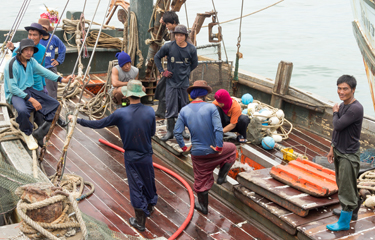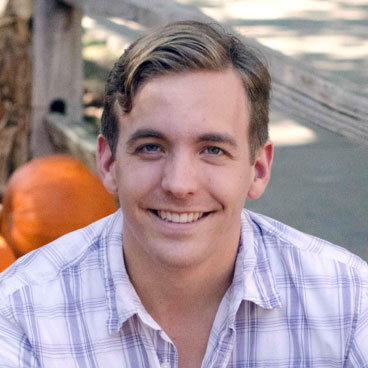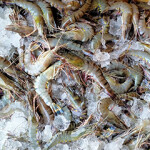New company offers social responsibility benchmarking for seafood industry

Seafood companies looking to demonstrate their commitment to environmentally sustainable fishing can choose from an array of assessments, audits, and certifications. But when they decide to show their dedication to treating workers well, they’re left with few options.
Poor working conditions at sea are rampant, and numerous reports have emerged in recent years of labor abuse and human rights violations, spurring a reckoning within the industry.
A new company, OSA International, seeks to solve that by offering assessments for companies that want to benchmark working conditions against global best practice, and signal their intent to improve the lives of their fishermen and other employees.
“We've done a really good job on sustainable seafood in the last 20 years,” OSA co-founder Katherine Short, who is a partner in the sustainability consultancy Terra Moana, told SeafoodSource. “We've had so much scrutiny on sustainability and traceability over the years in sustainable seafood, and now we're finally getting to the human side.”
OSA, which stands for On-board Social Accountability, will use an assessment tool developed by seafood consultant and OSA co-founder Marcelo Hidalgo that combines 20 of the top globally-recognized social accountability indicators. The tool enables companies to examine their social responsibility management systems and conduct comparative analyses across vessels, while delivering comprehensive reports that governments, fleet owners, buyers, and brands can use to provide transparency.
OSA is also aligning the tool with reporting requirements that are emerging from the Western and Central Pacific Fisheries Commission, and potentially from other regional fishery management organizations.
Currently, there is no single, globally accepted standard for social responsibility in fisheries, though the United Nations’ Food and Agriculture Organization is in the process of developing guidelines that the industry can use as a baseline. Those guidelines are just a starting point, though, Short said.
"It's usually the case that NGOs and leading industry players push the ceiling and then the governments, including the FAO and international entities, bring up the floor on guidance," Short said. "Often they're consolidating and bringing up a new level playing field. FAO guidelines are one thing. A globally-agreed standard is a completely different thing.”
OSA’s tool, by combining as many indicators as possible, seeks to define a common social responsibility benchmark, and create a standard against which companies can measure their performance. Leading companies are likely to embrace it, Short said, while others lag.
"Your leading companies dive in unafraid because they know the importance of continuous improvement and transparency. And then your second-tier middle companies take a little longer, and your third-tier companies are never going to do it unless their supply chains demand it," Short said.
OSA's process is strictly voluntary – an assessment, not an audit – and companies who hire OSA have the option of progressing through multiple stages of transparency verification, including corporate-level integrated reporting, and culminating with third-party verifications of working conditions and full transparency, if companies choose that.
"This is very much hiring us into the adjunct of the company and taking us on board as an improvement opportunity. It’s not about being punitive," Short said. "Rather, giving them the guidance and support to improve, including capability building, training, and management support."
The assessment process starts with a review of existing company policies and documentation, including operating procedures and systems manuals. An onsite visit follows, with an assessor conducting interviews with the crew – without company management present, to allow crew members to speak frankly. The assessor can get details such as the pay rates, nationality of crew members, working hours, and if they were recruited by management agencies – and what kind of cut a management agency might be taking.
“It involves a vessel walkthrough, literally looking for fire extinguishers, personal protective equipment and trip hazards, the canteen, the normal working conditions aspects,” Short said. During crew interviews, “that's when you can get into issues of wages and which crews are paid what,” she said. “These are very sensitive details that are important criteria to assess.”
Companies seeking to improve working conditions can take a few basic steps, according to Hidalgo, who in addition to being an OSA co-founder is also the founder of the consultancy SeafoodMatter. First is to set up a management system with carefully documented policies and procedures.
"Without a management system, you can't assess anything," Hidalgo told SeafoodSource.
Second is to communicate those policies – including pay, benefits, and bonuses – to workers. And third is to provide the proper personal protective equipment, which workers need to actually use.
Hidalgo started developing the social responsibility framework that OSA uses in 2011, when the government of Papua New Guinea asked him to do a social responsibility assessment of tuna processing facilities. By 2012, he was working on an assessment of the fleet itself.
In 2016, Short and Hidalgo collaborated to assess Austral Fisheries’ Patagonian toothfish vessels. The company wanted to assess operations and provide insights into crew arrangements. Ultimately, the assessment included a review of the strengths and weaknesses of Austral's policies and procedures, and recommended next steps to meet emerging social accountability standards.
Austral committed to the third and most stringent level of the assessment, providing checklists to customers and allowing those external parties to assess operations.
"Austral Fisheries strives to be ahead of the pack," Austral Fisheries CEO David Carter said in a statement. "We found the detailed assessment and capability building approach of Terra Moana and SeafoodMatter very helpful. We are excited to see them launching OSA International."
Now, the tool that Hidalgo and Short prototyped on Austral Fisheries can be used to assess seafood companies and fishing operations around the world. OSA is currently working with the Papua New Guinea Fishing Industry Association and conducted the first assessment of association member Frabelle Fishing Corporation.
“At Frabelle, we recognize that people who are cared for better care for each other, the product they make, and the environment we are privileged to fish in,” Frabelle President Francisco Tiu Laurel Jr. said in a statement provided to SeafoodSource.
Photo courtesy of Kevin Hellon/Shutterstock






Share